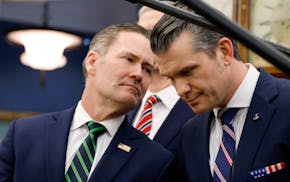Opinion editor's note: Star Tribune Voices publishes a mix of commentary online and in print each day. To contribute, click here.
•••
It's a close race.
With voters.
And with viewers, too.
That conclusion can be drawn from numerous national polls that show Vice President Kamala Harris with a slight presidential election lead over former President Donald Trump. Polls in swing states, by their very nature, are often even narrower.
And it can be drawn from another meaningful national number: Nielsen ratings of the Republican and Democratic National Conventions.
Including each convention's key event: the presidential nominees' speech to the delegates, and by extension, the nation. Viewership of Harris' acceptance address edged Trump's, with 28.9 million watching, which was about 500,000 more than the number who tuned in to see Trump accept the GOP nod for the third straight time.
Given his political ubiquity since he descended a Trump Tower elevator to announce his candidacy in 2015, and his years as a reality-TV star and decades as a tabloid figure before that, watching Trump on TV was not novel. But it was the first time for Americans to hear from the former president after an assassination attempt at a rally just days before.
Yet the country's curiosity about the Democrats' new nominee was slightly higher. And the DNC out-rated the RNC on each of the respective four nights of each convention. Especially on comparable Tuesdays, when 14.8 million tuned into the Republicans compared to 20.8 million watching the Democrats — in particular Barack and Michelle Obama, who electrified delegates in back-to-back speeches. (Conversely, the dearth of former presidents and nominees at the GOP confab may have reduced viewing interest, and perhaps party unity.)
The Democrats' ratings advantage occurred despite some featured speakers appearing after prime time. Or perhaps it was because of it, with habitual local news viewers tuning in right as the keynoters took the stage.
And either way the delayed addresses weren't as late as the Democrats' 1972 convention in Miami Beach, when it wasn't until past 2:30 a.m. when presidential nominee George McGovern tried to give a rousing speech to drowsy delegates. (The election was a sleeper too, with incumbent Richard Nixon winning 49 states, including McGovern's South Dakota.)
Like most politicians, Trump is focused on polls (and often the size of crowds at rivals' rallies). And he's uniquely tuned into TV ratings, too.
That was established early during his pre-political "Apprentice" era. In fact, at a programming meeting with marketers I attended in Los Angeles during my previous career in advertising, an NBC executive, to knowing nods from Trump, explained how the reality show host had begun to read Daily Variety — back then often called the show-business bible — even before the Wall Street Journal. Afterward, an affable Trump said that he indeed had knowledge of and interest in the Nielsen ratings that reflected his show's hit status.
The interest in the DNC comes on the heels of increased viewership of the track, swim, gymnastics and other athletic stars at the Summer Olympics in Paris, which soared some 82% above average ratings for the Tokyo Games three years earlier. While inherently different events (indeed, some may have turned to the Olympics to avoid politics) there were some similarities in demeanor and demographics to the DNC. Namely, the Olympics were upbeat — even joyful, in a phrase adopted by Democrats at their convention. And diverse too, with a near 50-50 gender split among athletes for the first time and with the multicultural mosaic Team USA looking like the country USA.
Whether the viewing/voting connection is correlation or causation or just coincidental remains to be seen. What seems sure is the potential next seminal event in a historic election year — the Sept. 10 Harris-Trump debate — will be watched by many.
That is, assuming it happens. As this column went to print, the debate was in doubt, with Trump voicing concerns about journalists at ABC, which is set to host, and Harris pushing for unmuted mics.
However it plays out, the debate dispute is just the latest drama in an election that at times seems itself like a reality show — a show in which the direction of the free world is at stake.
Stay tuned.
.

Rash: International Film Festival a reason to return to the theater


